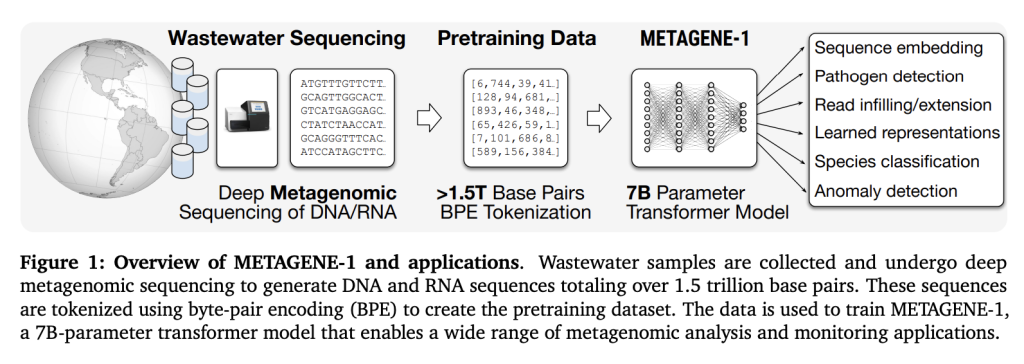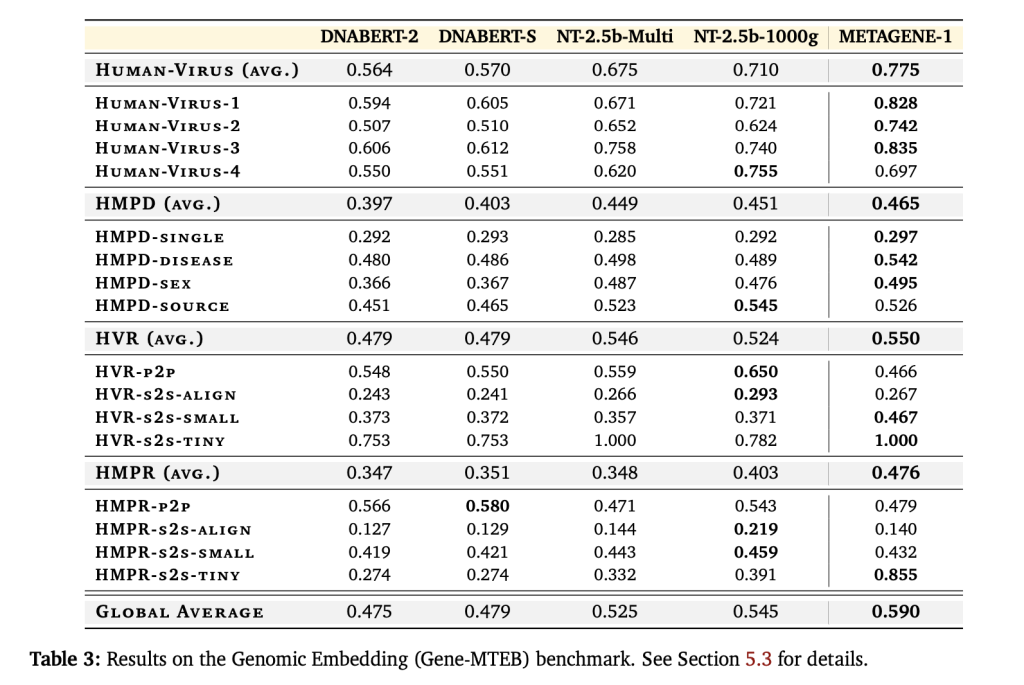At a time when global health faces persistent threats from emerging pandemics, the need for advanced biosurveillance and pathogen detection systems is increasingly evident. Traditional genomic analysis methods, while effective in isolated cases, often struggle to address the complexities of large-scale health monitoring. A major challenge is identifying and understanding genomic diversity in environments such as wastewater, which contain a rich mixture of microbial and viral DNA and RNA. Rapid advances in biological research have further emphasized the importance of scalable, accurate, and interpretable models for analyzing large amounts of metagenomic data, aiding in the prediction and mitigation of health crises.
Researchers from the University of Southern California, Prime Intellect and the Nucleic Acids Observatory have presented METAGENE-1, a metagenomic-based model. This 7 billion parameter autoregressive transformer model is specifically designed to analyze metagenomic sequences. METAGENE-1 is trained on a data set comprising more than 1.5 trillion base pairs of DNA and RNA derived from human wastewater samples, using next-generation sequencing technologies and a pair-coding tokenization strategy. of bytes (BPE) customized to capture the intricate genomic diversity present in these data sets. The model is open source, which encourages collaboration and further advances in the field.

Benefits and technical highlights
The METAGENE-1 architecture is based on modern transformer models, including the GPT and Llama families. This unique decoder transformer uses a causal language modeling objective to predict the next token in a sequence based on previous tokens. Its key features include:
- Diversity of data sets: The training data covers sequences from tens of thousands of species, representing the microbial and viral diversity found in human wastewater.
- Tokenization strategy: Using BPE tokenization allows the model to process new nucleic acid sequences efficiently.
- Training infrastructure: Advanced distributed training configurations ensured stable training on large data sets despite hardware limitations.
- Applications: METAGENE-1 supports tasks such as pathogen detection, anomaly detection, and species classification, making it valuable for metagenomic studies and public health research.
These features allow METAGENE-1 to generate high-quality sequence embeddings and adapt to specific tasks, improving its utility in genomics and public health domains.
Results and insights
METAGENE-1's capabilities were evaluated using multiple benchmarks, where it demonstrated remarkable performance. In a pathogen detection benchmark based on human wastewater samples, the model achieved an average Matthews correlation coefficient (MCC) of 92.96, significantly outperforming other models. Furthermore, METAGENE-1 showed strong results in anomaly detection tasks, effectively distinguishing metagenomic sequences from other genomic data sources.
In embedding-based genomic analyses, METAGENE-1 excelled in the Gene-MTEB benchmark, achieving an overall mean score of 0.59. This performance underscores its adaptability in both zero-shot and trim scenarios, reinforcing its value in handling complex and diverse metagenomic data.


Conclusion
METAGENE-1 represents a thoughtful integration of artificial intelligence and metagenomics. By leveraging transformer architectures, the model offers practical solutions for biosurveillance and pandemic preparedness. Its open source release invites researchers to collaborate and innovate, advancing the field of genomic science. As challenges related to emerging pathogens and global pandemics continue, METAGENE-1 demonstrates how technology can play a crucial role in addressing public health issues effectively and responsibly.
Verify he <a target="_blank" href="https://metagene.ai/metagene-1-paper.pdf” target=”_blank” rel=”noreferrer noopener”>Paper, <a target="_blank" href="https://metagene.ai/” target=”_blank” rel=”noreferrer noopener”>Website, <a target="_blank" href="https://github.com/metagene-ai/metagene-pretrain” target=”_blank” rel=”noreferrer noopener”>GitHub pageand <a target="_blank" href="https://huggingface.co/metagene-ai” target=”_blank” rel=”noreferrer noopener”>Model hugging face. All credit for this research goes to the researchers of this project. Also, don't forget to follow us on <a target="_blank" href="https://twitter.com/Marktechpost”>twitter and join our Telegram channel and LinkedIn Grabove. Don't forget to join our SubReddit over 60,000 ml.
UPCOMING FREE ai WEBINAR (JANUARY 15, 2025): <a target="_blank" href="https://info.gretel.ai/boost-llm-accuracy-with-sd-and-evaluation-intelligence?utm_source=marktechpost&utm_medium=newsletter&utm_campaign=202501_gretel_galileo_webinar”>Increase LLM Accuracy with Synthetic Data and Assessment Intelligence–<a target="_blank" href="https://info.gretel.ai/boost-llm-accuracy-with-sd-and-evaluation-intelligence?utm_source=marktechpost&utm_medium=newsletter&utm_campaign=202501_gretel_galileo_webinar”>Join this webinar to learn practical information to improve LLM model performance and accuracy while protecting data privacy..
Asif Razzaq is the CEO of Marktechpost Media Inc.. As a visionary entrepreneur and engineer, Asif is committed to harnessing the potential of artificial intelligence for social good. Their most recent endeavor is the launch of an ai media platform, Marktechpost, which stands out for its in-depth coverage of machine learning and deep learning news that is technically sound and easily understandable to a wide audience. The platform has more than 2 million monthly visits, which illustrates its popularity among the public.
<script async src="//platform.twitter.com/widgets.js” charset=”utf-8″>






